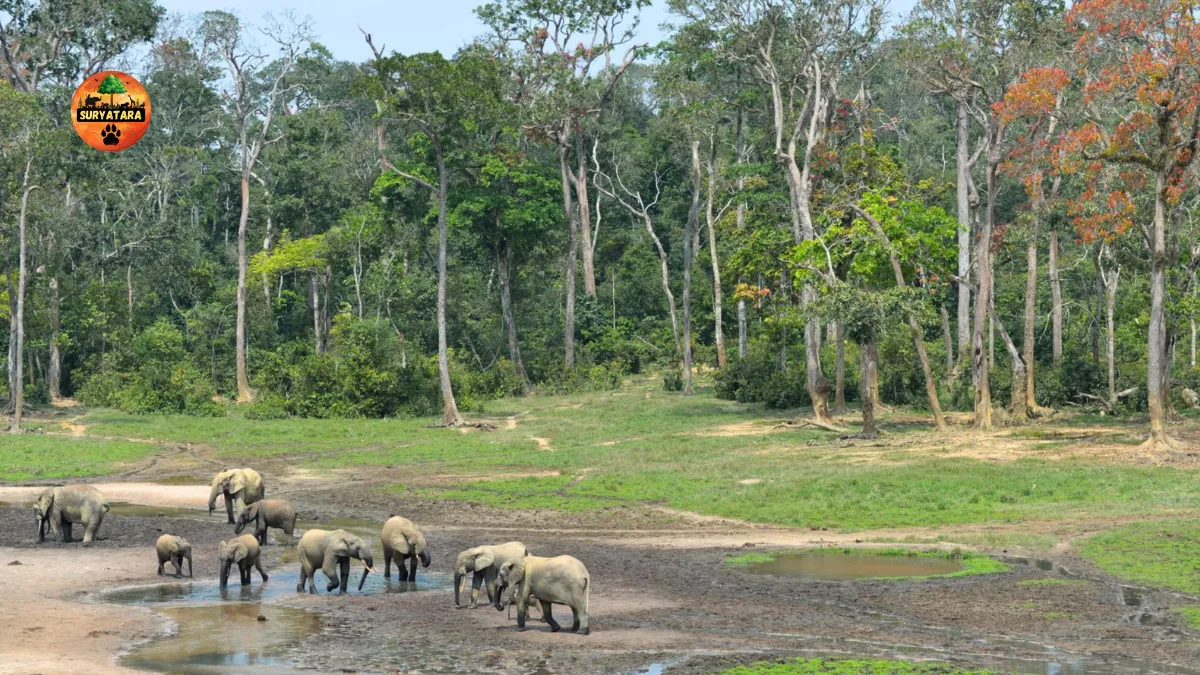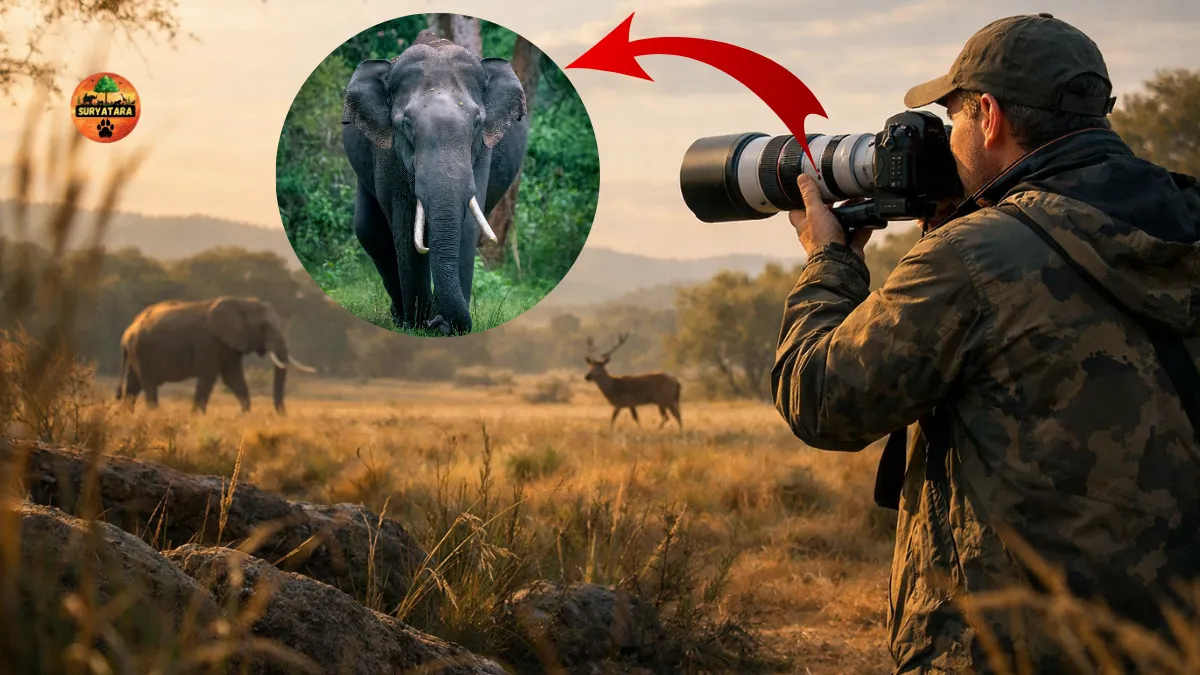The Ebony Project highlights a surprising yet critical connection between endangered African elephants and the survival of musical instruments such as pianos and guitars. A new UCLA-led study has revealed that the extinction of African elephants could not only harm biodiversity but also threaten the future availability of ebony wood, a material essential for making high-quality musical instruments.
The Elephant-Music Connection

At first glance, elephants and music may seem worlds apart. However, researchers have found a direct ecological link between the survival of African elephants and the sustainability of ebony trees. Ebony wood, known for its dark, dense, and durable qualities, is widely used in piano keys, guitar fretboards, and violin fingerboards. Without elephants, the natural regeneration of ebony in African rainforests faces a serious threat.
Scientists working in the Congo rainforest discovered a striking pattern: areas where elephants had disappeared showed 68% fewer young ebony saplings compared to regions where elephants were still present. This difference is directly tied to elephants’ unique role in the ecosystem.
How Elephants Help Ebony Trees Survive

Elephants act as “gardeners of the forest.” They consume ebony fruit, travel long distances, and spread the seeds through their droppings. This natural dispersal process not only moves the seeds far from the parent tree but also protects them, giving them a better chance to grow.
Many tree species in African rainforests rely on large animals like elephants for seed dispersal. Without these giants, forests risk becoming less diverse, and slow-growing trees like ebony may struggle to regenerate. Ebony trees take 60 to 200 years to mature, meaning that any decline in natural regeneration could have long-lasting consequences.
The Nine-Year Initiative: The Ebony Project

To address this urgent ecological and cultural challenge, scientists, local communities, and global partners launched The Ebony Project, a nine-year-long conservation and research initiative. The project connects UCLA’s Congo Basin Institute with the Indigenous Baka people and other forest communities in the Congo Basin. Importantly, it has also partnered with Taylor Guitars, a company known for producing world-class acoustic guitars.
Taylor Guitars played a crucial role by funding nurseries and on-the-ground fieldwork. Together, the project team achieved remarkable milestones:
- 40,000 ebony trees planted
- 20,000 fruit trees planted
- A successful method to grow ebony trees directly from seeds
- Scientific confirmation of elephants’ vital role in ebony’s life cycle
This initiative has not only boosted reforestation but also provided sustainable livelihoods to local communities who rely on forest resources.
Why Music Depends on Forest Conservation
The future of musical craftsmanship depends on the survival of natural materials like ebony. Piano keys, guitar fretboards, and violin fingerboards all rely on this dense black wood. Without a reliable supply of ebony, the music industry would be forced to look for alternatives, potentially compromising both tradition and quality.
The connection underscores a larger reality: biodiversity loss does not just affect forests and animals, but also human culture, art, and industries worldwide. Musical heritage, in this case, is directly tied to conservation.
Voices from the Research
Thomas Smith, senior author of the study and a UCLA distinguished research professor, emphasized the global implications of the findings.
“People think it’s a shame these magnificent creatures are threatened, but what they don’t understand is that we won’t just lose elephants, we’ll also lose the ecological functions they provide,” Smith explained.
In other words, the disappearance of elephants creates a domino effect. It is not just the elephants at risk, but entire ecosystems, tree species, and even global music traditions that depend on natural materials.
Community-Led Conservation
One of the most promising aspects of The Ebony Project is its collaboration with local and Indigenous communities. The Baka people and other groups living in the Congo Basin play an essential role in planting and protecting ebony and fruit trees. By engaging these communities directly, the project ensures that conservation efforts align with local needs, traditions, and livelihoods.
This community-based approach also makes conservation sustainable in the long run. Instead of imposing external strategies, the project empowers local stewards to take the lead in forest restoration.
Ebony and the Global Market
The international demand for ebony has historically contributed to overharvesting, illegal logging, and unsustainable practices. By demonstrating how ebony can be cultivated and regenerated with the help of elephants and human efforts, The Ebony Project offers a sustainable solution to balance global demand with conservation.
Musical instrument makers like Taylor Guitars are also setting an example for other industries by investing directly in the ecosystems that supply their raw materials. Such partnerships represent a new model of corporate responsibility where companies contribute to the preservation of biodiversity that sustains their products.
The Bigger Picture: Why Elephants Matter Beyond Music
Elephants are considered a “keystone species” in many ecosystems. Their feeding and movement patterns shape landscapes, spread seeds, and create opportunities for other plants and animals to thrive. Without elephants, the structure and function of forests could drastically change.
The case of ebony highlights just one example of how the loss of elephants can ripple into human culture. From the rainforest floor to concert halls, the fate of elephants is intertwined with art, economy, and ecological health.
Also read: Top 10 African Safari Packages with Prices & Booking Tips
Table: Key Facts About The Ebony Project
| Aspect | Details |
|---|---|
| Project Name | The Ebony Project |
| Duration | 9 years (UCLA-led initiative) |
| Main Partners | Congo Basin Institute, Baka people, Taylor Guitars |
| Trees Planted | 40,000 ebony trees, 20,000 fruit trees |
| Scientific Finding | 68% fewer ebony saplings in areas without elephants |
| Role of Elephants | Spread ebony seeds through fruit consumption and droppings |
| Cultural Impact | Ebony wood essential for pianos, guitars, and violins |
| Conservation Goal | Ensure sustainable regeneration of ebony and protect elephant habitats |
Also read: Edinburgh Zoo Travel Guide,Tickets, Timings, Animals & Tips
A Call for Global Awareness
The story of The Ebony Project is not just about trees or elephants—it is about the connections between nature, culture, and human creativity. Music lovers, environmentalists, and policymakers must recognize that protecting elephants is also a way of preserving the instruments and traditions that bring joy to millions of people.
Conservation efforts like this show how science, communities, and industry can come together to address global challenges. By protecting elephants, replanting ebony, and supporting sustainable livelihoods, the project is creating harmony not only in forests but also in music.













